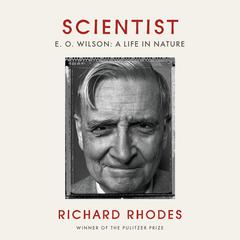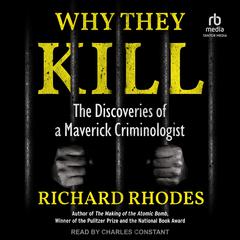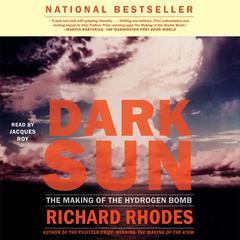 Play Audiobook Sample
Play Audiobook Sample
Hedy's Folly: The Life and Breakthrough Inventions of Hedy Lamarr, the Most Beautiful Woman in the World Audiobook
 Play Audiobook Sample
Play Audiobook Sample
Quick Stats About this Audiobook
Total Audiobook Chapters:
Longest Chapter Length:
Shortest Chapter Length:
Average Chapter Length:
Audiobooks by this Author:
Publisher Description
What do Hedy Lamarr, avant-garde composer George Antheil, and your cell phone have in common? The answer is spread-spectrum radio: a revolutionary invention based on the rapid switching of communications signals among a spread of different frequencies. Without this technology, we would not have the digital comforts that we take for granted today. Only a writer of Richard Rhodes’s caliber could do justice to this remarkable story. Unhappily married to a Nazi arms dealer, Lamarr fled to America at the start of World War II; she brought with her not only her theatrical talent but also a gift for technical innovation. An introduction to Antheil at a Hollywood dinner table culminated in a U.S. patent for a jam- proof radio guidance system for torpedoes—the unlikely duo’s gift to the U.S. war effort. What other book brings together 1920s Paris, player pianos, Nazi weaponry, and digital wireless into one satisfying whole? In its juxtaposition of Hollywood glamour with the reality of a brutal war, Hedy’s Folly is a riveting book about unlikely amateur inventors collaborating to change the world.
Download and start listening now!
Hedy's Folly Listener Reviews
-
" ok.... interesting story; however, could not understand the science/engineering "
— Sue, 2/13/2014 -
" I was unimpressed by this biography. I was intrigued by reading about the intellectual life of a woman who was known mostly for her looks. The execution was dissapointing. It was ok, but very dry. I would have liked to hear more about Hedy and less about her partner. "
— Kathleen, 2/5/2014 -
" Poor Hedy. Marginalized even in her own biography. Author goes off on long tangents, spending entire chapters with out even mentioning Ms. Lamarr. Her Wikipedia entry provides just as much information. Frustrated me so much, I barely got past the halfway mark before giving up. "
— Jourdan, 1/31/2014 -
" This was an entertaining little book offering vignettes into the interesting lives of Hedy Lamarr and George Antheil in 1920s Vienna and Paris, 1930s NYC and Hollywood, and beyond. It also offered an interesting exposition of their contribution to technology - frequency hopping or spread spectrum transmission - and follow up on how the technology developed and provides the electrical infrastructure of modern day communications, such as cell phone service. It did not offer much in the elaboration of HOW they collaborated on this project. They were an unlikely couple of polymaths. In fact, entire story is unlikely, and is the charm of the book. However, their invention was never used by the Navy, and was filed and forgotten, much like the Ark of the Covenant was stored at the back of the vast warehouse at the end of "Raiders of the Lost Ark". It left one wondering why this book was written. It was anticlimactic. It is as though the author conducted research which showed that there wasn't much of a cohesive story there, albeit interesting characters, and decided that he couldn't let that research go to waste - hence, the book. It is a lightweight book - an entertainment rather than a serious attempt at scholarship. Mere journalism. "
— Scott, 1/27/2014 -
" There is no doubting that Hedy was a genius but the amazing story of her life fell a little flat in this retelling. "
— Elle, 1/19/2014 -
" Very interesting! I enjoyed the biographies of both Hedy Lamarr and the composer George Antheil (not indicated in the title), who was her partner in her invention of a "frequency-hopping" technique to guide missiles remotely by radio. I especially enjoyed the evocations of interwar Vienna and Paris. "
— Drianne, 1/3/2014 -
" Hedy seemed an interesting person with an interesting life, but this book doesn't have much detail about her, overall. We learned about her and her invention through others' stories. "
— Jennie, 10/31/2013 -
" By the end I really didn't feel a strong connection to either George or Hedy. The book jumped around too much. The author spent more time than I thought was necessary in some areas and then hardly even touched others. It left me with unanswered questions. "
— Jenny, 4/26/2013 -
" Hedy is the titular focus, but Richard Rhodes focuses as much attention on her partner, composer George Antheil. Hedy's Folly is well researched but its focus drifted heavily and whenever it gravitated into scientific information it became bone dry. "
— David, 4/18/2013 -
" Too much padding to make the book longer. The main story was fascinating. "
— Colleen, 4/18/2013 -
" Another library book that I'm glad is a library book! The library, ladies and gents, is the perfect place to pick up and drop off a book that is entertaining and not that illuminating. This was a quick read! "
— beth, 4/13/2013 -
" This book did not live up to its potential. "
— Denise, 2/14/2013 -
" Quick read ... a breezy story. Definitely feels like an expanded magazine article, but a very entertaining one. The lack of mention of George Antheil is a bit funny since he occupies half the story and one of the undercurrents is that his contribution was neglected. Perpetuating the oversight! "
— Ryan, 1/18/2013 -
" Informative but way too bogged down in details I really didn't find added to the narrative, nor did they enhance the story in any meaningful way. However, it was a fascinating glimpse into the life of an ambitious, smart and beautiful personality, I knew nothing about. Overall very satisfying. "
— Steve, 10/16/2012 -
" While I enjoyed the milieu and detailed biography of Hedy and George, I found the introduction and initial discussion of George abrupt and confusing. I also enjoyed learning about Hedy's pioneering invention. Even if the actual technical section was pretty short. And there are scant details. "
— Unit, 9/25/2012 -
" I think the author tried to make something somewhat interesting turn into something really sensational, and failed. There was enough factual story here to make a gripping book, but somehow it didn't translate well. "
— Kristen, 7/17/2012 -
" An engaging history of the collaboration of Hedy Lamarr and George Antheil on the invention of frequency-hopping spectrum spread communications. "
— Holly, 1/17/2012
About Richard Rhodes
Richard Rhodes is the author of twenty-six books including The Making of the Atomic Bomb, which won the Pulitzer Prize in Nonfiction, the National Book Award, and the National Book Critics Circle Award. He graduated from Yale University and has received fellowships from the Ford Foundation, the National Endowment for the Arts, the John Simon Guggenheim Memorial Foundation, and the Alfred P. Sloan Foundation. He has been a visiting scholar at Harvard, MIT, and Stanford and a host and correspondent for documentaries on American public television.
About Bernadette Dunne
Bernadette Dunne is the winner of numerous AudioFile Earphones Awards and has twice been nominated for the prestigious Audie Award. She studied at the Royal National Theatre in London and the Studio Theater in Washington, DC, and has appeared at the Kennedy Center and off Broadway.























